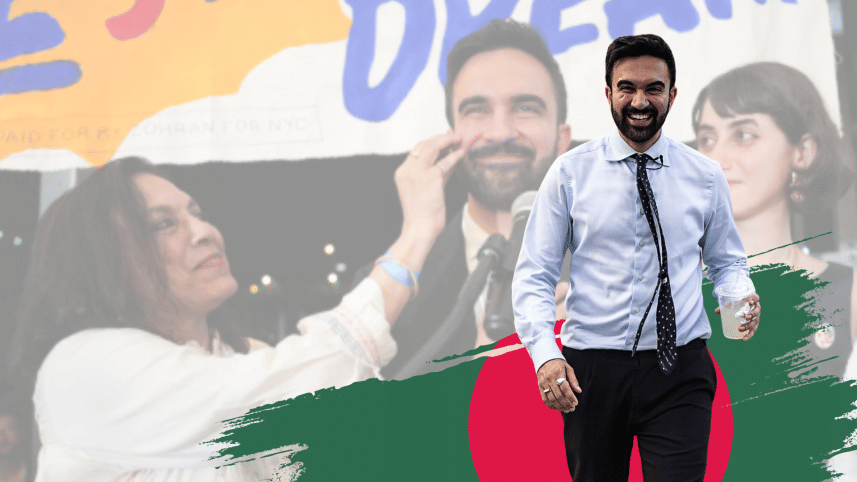How Bangladeshi aunties cooked up Zohran Mamdani’s NYC political win

A New York politician speaking fluent Bangla, referencing his nani (grandma) in campaign videos, explaining ranked-choice voting through mishti (sweet) metaphors, and confidently correcting a former governor on the pronunciation of his name — it all may sound like political satire, but it's not. It's the very real story of Zohran Kwame Mamdani.
A name most of us didn't even know a week ago. And now? We can't stop talking about him. Not just because he won big in NYC's Democratic mayoral primary, but because, through him — suddenly — everyone is talking about our aunties. Yes, those Bangladeshi aunties who were always there with a bowl of rice and a side of unsolicited wisdom.
So, what actually happened?
Mamdani, the 33-year-old democratic socialist, recently achieved a primary victory in New York City that has taken social media — and immigrant households — by storm. Why?
Well, because Mamdani didn't just run a campaign. He cooked one — with the desi aunties. And the main ingredients? Culture, community, and unapologetic desi vibes. He ran a campaign that knocked down cultural walls.
There were no bland slogans or one-size-fits-all messages for "immigrant voters." He didn't try to relate to immigrants with generic talking points. No sir. He rapped in Bangla, and Hindi, made videos featuring desi snacks, referenced his nani, and even adopted the slogan "Roti and Roses" — a cheeky twist on the socialist "Bread and Roses" ideal, but of course, with more spice and soul. His campaign did everything except rely on the usual political playbook.
But beneath all the wit and warmth was strategy. This was deep, grassroots organising — powered by aunties from Jackson Heights to the Bronx, who turned pavements into strategy maps. Armed with leaflets, flip-flops, and fierce conviction, they knocked on doors and hearts alike. Some in trainers, some in slippers, they explained ranked-choice voting in Bengali and English. And that worked. Why?
Because no campaign leaflet could compete with the firm yet loving voice of an aunty asking, "Baba, ekhono vote dao ni?" ("Son, you haven't voted yet?") That's not persuasion. That's a full-blown emotional subpoena. That's guilt-trip gold. That's everything!
These aunties served as living bridges between seat belted politicians and working-class immigrants who've long felt politically invisible. And Mamdani? He didn't miss the chance to thank them, calling it "our victory" — a plural pronoun that resonated deeply. In his victory speech, he said:
"This is the victory of the Bangladeshi aunty who knocked on door after door until her feet throbbed and her knuckles ached."
Now, let's pause and appreciate that: a New York politician, on stage, proudly uttering "Bangladeshi aunties" — at a victory speech, like they were Avengers. Because they were.
For many in the crowd there, and here in Bangladesh, it was probably the first time they'd heard a New York politician utter the phrase "Bangladeshi aunty" with such pride and reverence.
Although Mamdani's sharpness extended beyond poetic tributes. At one event, when former Governor Andrew Cuomo publicly stumbled over his name, Mamdani made sure to correct him with a breakdown: "M-A-M-D-A-N-I!" on camera. It was more than a pronunciation lesson. It was a quiet assertion that immigrant names, identities, and voices deserve full recognition — not abbreviation.
His win was more than electoral. It was symbolic. It uplifted renters, immigrants, working-class families, and especially those often relegated to the background of campaigns. This time, they were the campaign.
Mamdani, the Bronx-raised son of Ugandan and South Asian parents — academic Mahmood Mamdani and filmmaker Mira Nair — has shown that politics doesn't have to be sterile or staged. It can be joyful, rooted, and real. And sometimes, all it takes is a few aunties, some biryani, and a bold refusal to be ignored.
So, the next time an aunty tells you to vote — listen. She might just be leading a political revolution. You never know!




 For all latest news, follow The Daily Star's Google News channel.
For all latest news, follow The Daily Star's Google News channel.
Comments